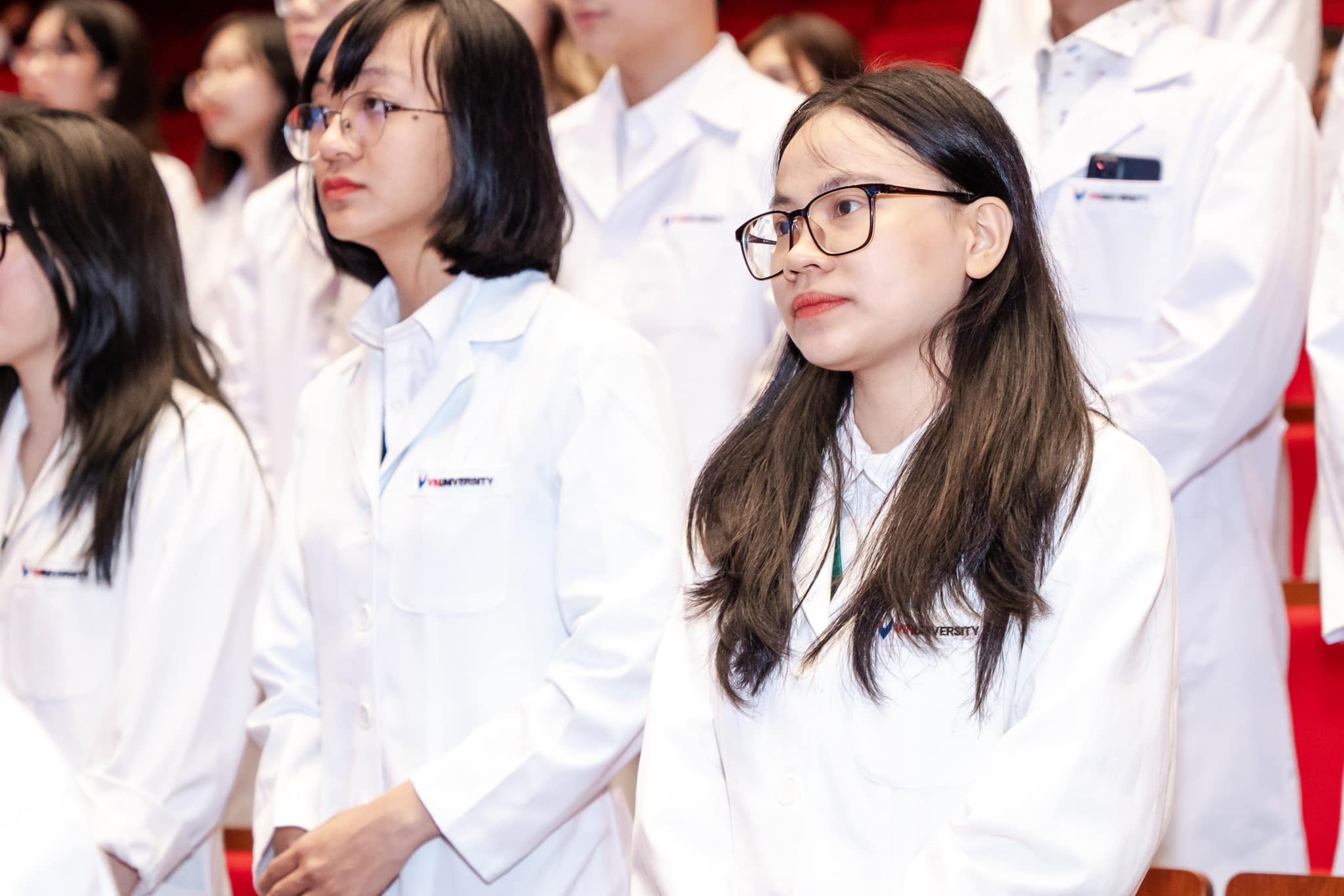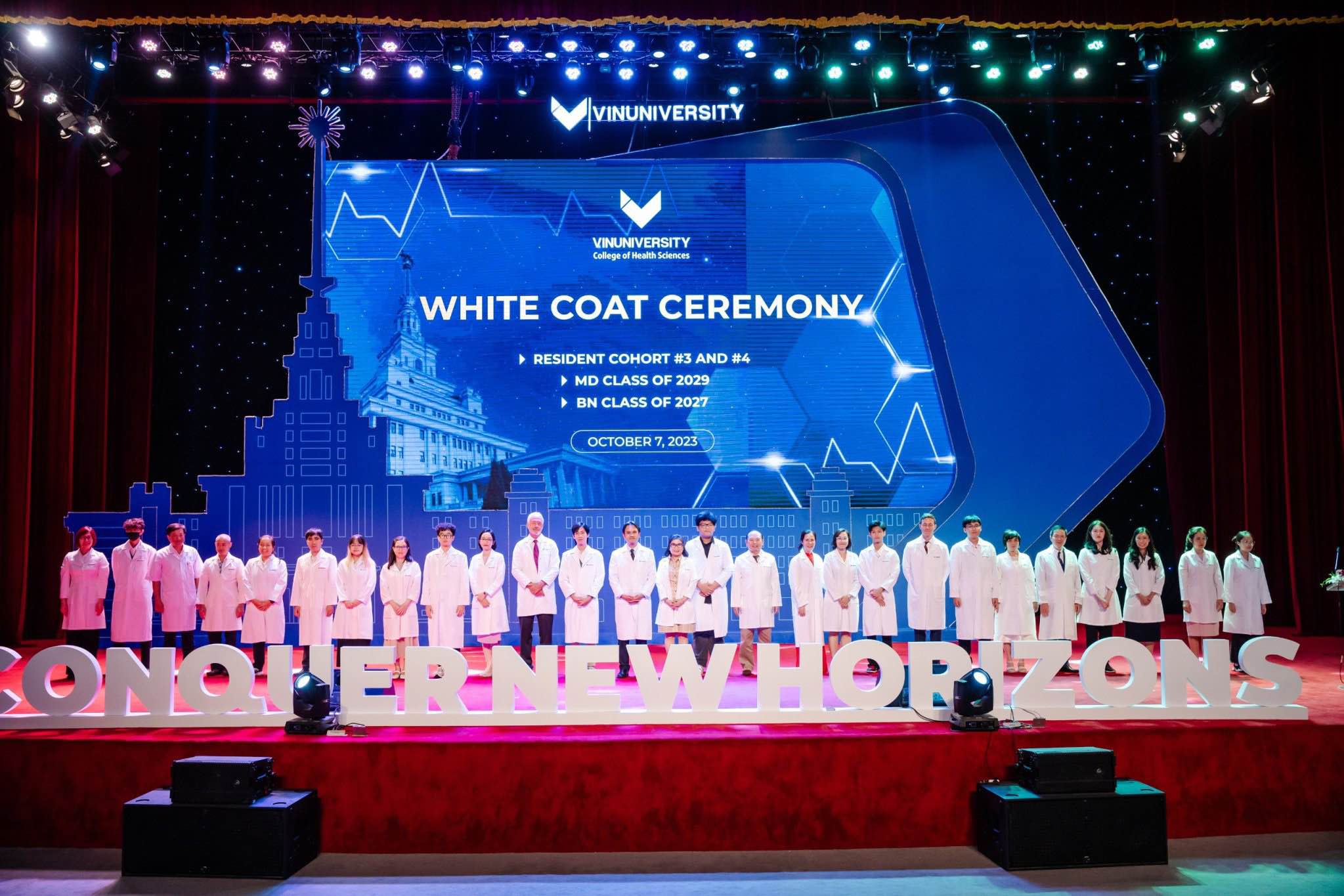White Coat Ceremony and the inspirational story of VinUni Provost
Event date: 10/10/2023
White Coat Ceremony and the inspirational story of VinUni Provost
On Convocation Day, the White Coat Ceremony was organized by College of Health Sciences for VinUni freshmen. The students listened to the sharing, advice and inspirational stories from Professor David Bangsberg – VinUni Provost cum Dean of College of Health Sciences . To CHS students, he is a remarkable teacher in the white blouse. Below is Professor Bangsberg’s speech in verbatim at this meaningful event.

Provost David Bangsberg shared his inspiritional story at VinUni White Coat Ceremony
“Welcome to our White Coat Ceremony. This is a very important day. Today is the day that marks your transition from the study of preclinical to clinical health sciences – or more simply said – it is the day where you accept the privilege and responsibility of caring for patients.
This marks the transition of you learning from text books to learning from your patients’ stories, their experiences, their aspirations, their losses, their bodies and the essence of who they have been and who they aspire to be.
Today you will take the Hippocratic Oath written between the 5th and 3rd century BC. The Hippocratic oath requires you to promise to abide by the ethical standards in medicine. It is the earliest expression of medical ethics. These include the principles of medical confidentiality and non-maleficence – or do no harm.
Taking this oath and practicing this oath is an enormous honor, privilege and responsibility. In this next stage of your profession, you will participate in the most intimate and important events of peoples’ lives.
I remember helping deliver a baby as a 3rd year medical student. I watched a patient go through labor and then the baby pass through the birth canal. I remember my teaching attending telling me that there are only three medical student rules in obstetrics. Obey all three and you will get an A:
- Do not drop the baby.
- Do not drop the baby.
- Do not drop the baby.
New born babies are slippery and wiggle a lot. Not dropping them is not as easy as it sounds. Thankfully, I didn’t drop the baby and I received an A in obstetrics!
The baby I helped deliver was dark red, almost purple. Once it was free of the birth canal, it took its first breath, started to cry, then it turned bright pink. I cut the umbilical cord as the nurse wrapped the baby in a blanket and gave it to the mom and dad to hold. Mom and dad were overwhelmed with joy. To be part of this joy is the greatest honor and privilege possible.
There are also tragic times that are just as much if not more of an honor, privilege and responsibility.

College of Health Sciences’s Freshmen was inspried by Provost David Bangsberg’s sharing
I was on the night shift as a new doctor in Columbia Presbyterian Hospital in New York City when I was called by a nurse for a patient that was having trouble breathing. The patient was with her family and had end stage cancer that had spread to her lungs. She had been through every type of chemotherapy, radiation therapy, and surgery there was. There were no more options.
We had to help the patient make a decision with her family whether to put her on a breathing machine that night knowing that she would never come off the machine; or whether we should keep her comfortable and let her pass in the next 24hrs.
I was a new doctor. I didn’t have the knowledge or the experience that was required to help this patient and her family make this decision. Thankfully, there was a more senior doctor. Her name was Jackie Petersen who did have the knowledge and the experience. She showed me the right medications to take some of the fluid off her lungs so we could give her more time with her family to make the decision.
She responded to the medications and we were able to give her some time. We explained the options, answered questions from her and her family. She decided to say goodbye to her family that night. She passed comfortably the next morning with her family at her side. It was a privilege beyond words to be there to help my patient and her family make that decision, to be there to keep her comfortable, and give her time to say goodbye.
Jackie Petersen and I became best friends that night because she helped me understand both the technical delivery of medicine and also the human practice of medicine to provide comfort and caring during life’s most difficult times. I will always be grateful to Dr. Petersen for guiding me that night. Dr. Petersen remains one of my closest friends to this day.
It is an enormous privilege to share the greatest joys and greatest sorrows with your patients – to provide not only the best medical care possible but equally important empathy, understanding and comfort when it is needed most.
It is also an enormous responsibility. A responsibility to have the best information possible to make the right diagnosis and render the right treatment. A responsibility to honor the trust that is conferred on you every day by each and every one of your patients.
You might be nervous about this journey ahead of you.
Being nervous is a good thing – it means you care.
You also might be thinking right now: Am I really ready for this?
As many of you know, I start most every day talking to students over coffee. During each of these coffees, I have seen your intelligence, your commitment, your compassion.
I know you are ready for this. You are smart. You are hard working. You are caring. You are most definitely ready for this journey and to accept the honor, privilege and responsibility that goes with it.
You are also ready because you are not alone now nor will you be alone on this journey. You have great medical and nursing faculty both at VinUni and Vinmec who will be at your side and who will show you the way.
Your Jackie Petersen will also be there for you as mine was for me. Ask for their help, listen to their wisdom. Your Jackie Petersen might be a doctor, but it is more likely to be a nurse.

Overview of White Coat Ceremony at VinUni’s Convocation Day
Doctors, listen to the nurses because they will tell you what you most need to know exactly when you need to know it – and that is – how to care for your patients. Nurses kept me from making mistakes that would harm patients more times than I can count. The only young doctors who really messed up were the ones who thought they were too good to learn from nurses. Nurses, please speak up whenever necessary for your patient. Listen to each other. It will be one of the best things you can do for your patients.
You are about to participate in the most important and meaningful aspects of life and truly experience what it means to become – and to be – human.
I am pleased and honored to be here with you while you begin this tremendous journey
Congratulations and Godspeed”.

